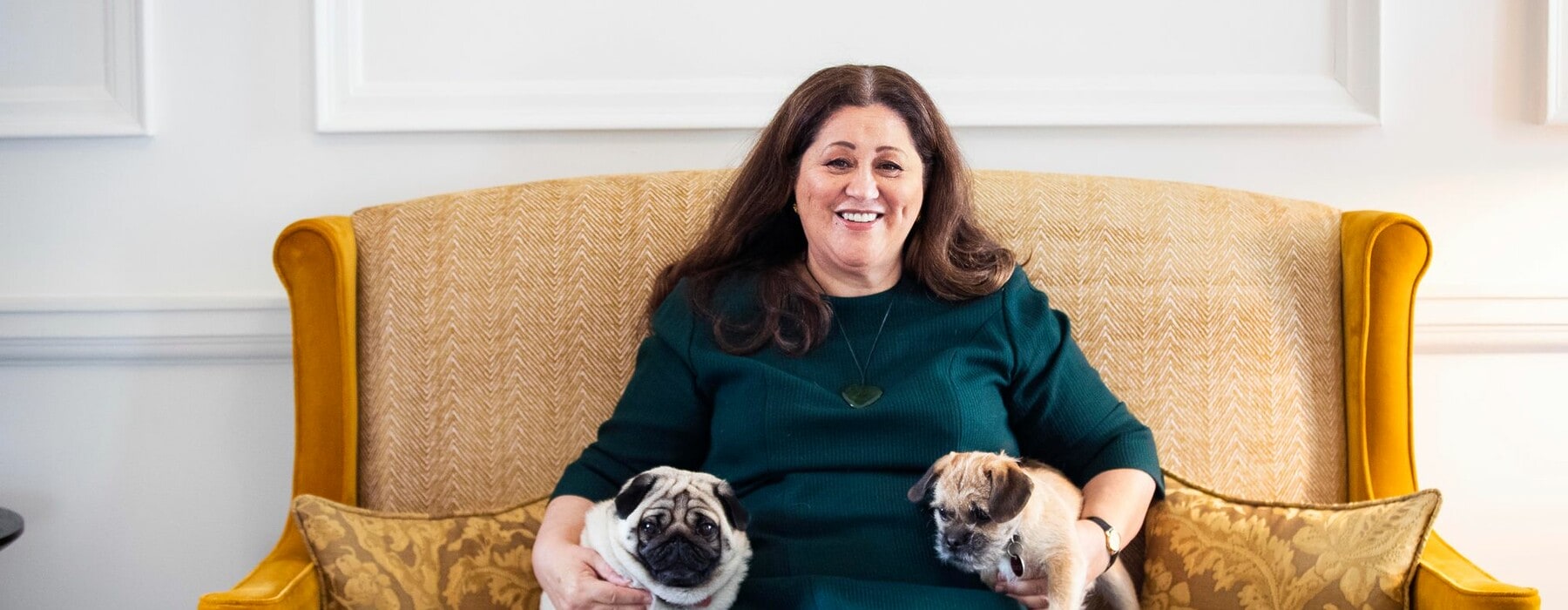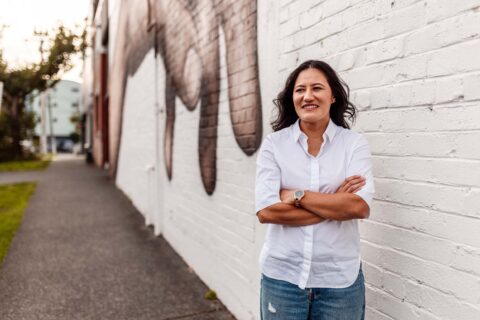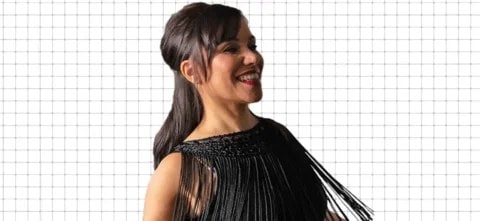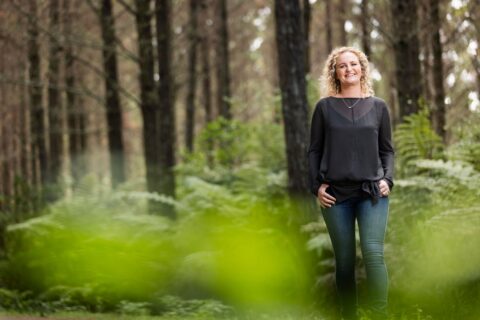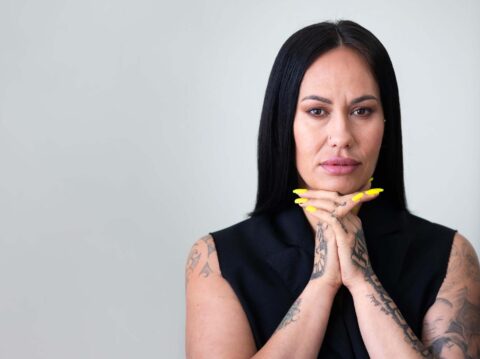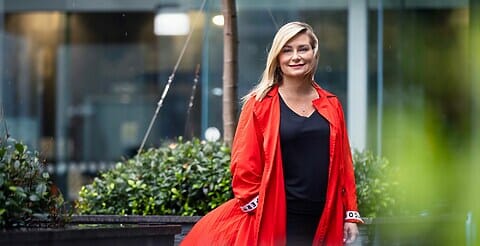Does anyone have a lint brush? “They’re not words you’d expect to hear from the Governor-General, the Queen’s representative in Aotearoa. But Dame Cindy Kiro, our newest Governor-General – and the first wāhine Māori to hold the title – is about to be photographed for this story and she’s realised her dress is covered in dog hair.
How did we get here? Blame Pebbles, Dame Cindy’s beloved pug who’s been using her owner as a cushion for the last hour, her soft snores providing the soundtrack to our interview.
“If Pebbles wants to sit on my lap, she’ll find a way,” laughs Dame Cindy. “She’s very determined.”
A bit like her owner, really.
On a day that promised sunshine but delivered rain, Dame Cindy makes herself, Pebbles and eight-month-old schnauzer-pug Lucy comfortable in an art-filled room on the ground floor of Government House. Sipping tea (milk, no sugar), she explains that she’s as surprised as anyone to be here.
“I had no idea what I wanted to do when I left school, and I’ve never had a career plan, which everyone is shocked to hear. But I was the first in my family to go to university, I became a professor, a pro-vice chancellor at the University of Auckland, then a chief executive and now the Governor-General. It’s a career that certainly wasn’t in the cards for me as a child.”
So much so that when Prime Minister Jacinda Ardern summoned Dame Cindy to the ninth floor of the Beehive earlier this year, she wasn’t sure why.
“I was taken aback when she mentioned the Governor-General role. I wondered if I’d heard her correctly,” Dame Cindy recalls. “But here I am! I’m very grateful for the role and determined to do the best for my country, because I absolutely love and am committed to Aotearoa.”
Dame Cindy, New Zealand’s first Governor-General to come from a predominately academic background, is as charming, warm and unguarded as I’d been told. The 63-year-old has also mastered the art of making people feel as though they’ve been her friends for years.
It’s partly to do with her background, which includes stints in the social justice trenches.
“I have a deep personal connection to people, especially those struggling to put food on the table and raise a family,” she says. “Because of my early career as a social worker and later in welfare reform roles, I honed the ability to connect with people who maybe haven’t had lots of opportunities. I want to be the kind of person who’s warm and open, who understands their situation.”
Dame Cindy has only been in her new role for a few weeks, and the mother of two – and stepmother of two – says she’s most looking forward to “meeting people doing amazing things”.
“What inspires me are people and organisations doing work that will make a positive difference to their lives, their country and ultimately their world. If I had to identify one thing I want to achieve in my five years in this role, it’s helping to unify the country. To focus on things that matter to me, especially the faceless, voiceless and the disenfranchised. That includes some of the young leaders emerging from South Auckland, but also those who have not only been here for a long time, such as Māori and tangata whenua, but also more recent migrants and refugees who have been through so much, have had to be incredibly resilient to survive and are now making an important contribution to Aotearoa.”
Dame Cindy’s full and varied CV tells the story of hard graft and determination. She was born in Whangārei, the eldest of six children, to a British father and Māori mother (she identifies as Ngāpuhi, Ngāti Hine and Ngāti Kahu). During the first few years of Dame Cindy’s life, she was whāngai (raised by her grandparents).
“We weren’t rich in material terms, but we were rich with the quality of relationships that we had with each other”.
In fact, she can recall having just two pairs of shoes: gumboots for winter and Roman sandals for summer. “I was about nine when my godfather gave me a pair of leather dress shoes. It was like all my Christmases at once!”
Yet unlike her predecessor, Dame Patsy Reddy, who was known for her love of shoes, Dame Cindy isn’t overly fussed about what she covers her feet with.
“These are my only flash shoes,” she laughs, sticking her legs out. “I’m a terrible shoe shopper. I hate shopping for them so I enjoy the ones I have. Incidentally, I don’t have Roman sandals anymore but I do still own a pair of gumboots!”
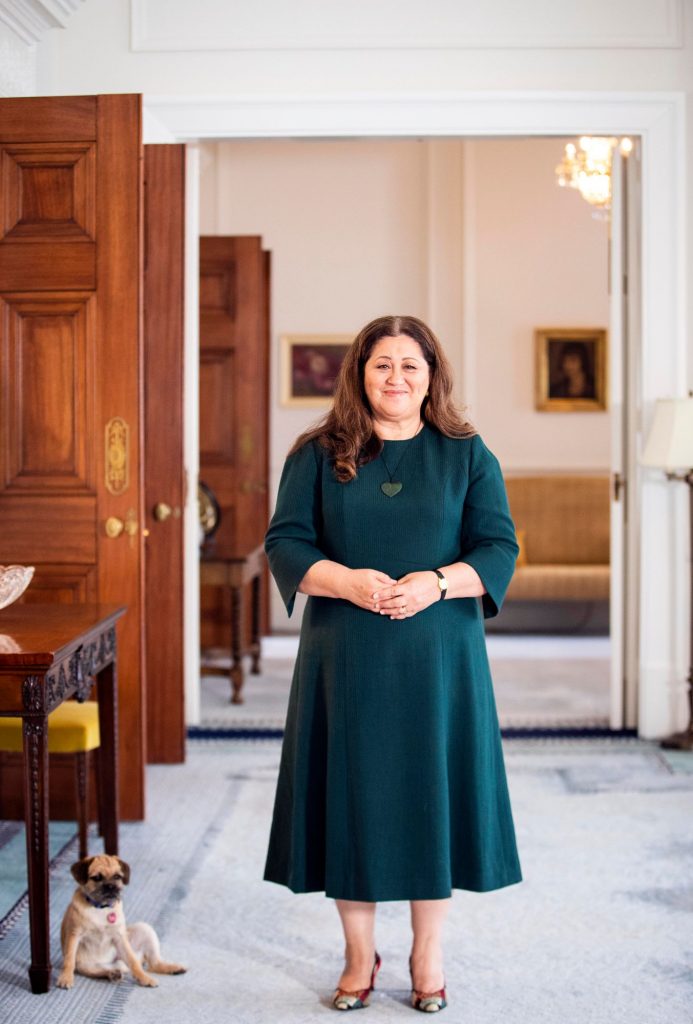
Growing up, Dame Cindy didn’t experience violence in her own home, but she was well aware of it.
“I once saw my cousin have a broom broken over his back because he’d eaten all the Weet-Bix and there was none left for us! I made the decision early on that I didn’t want to live in a home where violence existed.”
It’s possibly what drove the then Children’s Commissioner to wade into the debate around the controversial 2007 Anti- Smacking Bill. “Families can be complicated, but violence in the home is disturbing and I have zero tolerance for it.”
Books and school became a refuge for the young Dame Cindy. A compliant child, she thrived under inspiring teachers and while she wasn’t sure what life post-school might look like, she was crystal clear about what she didn’t want to do. “I come from a family of manual workers, including my father who was a truck driver and labourer. And I’ve done it myself while I was a student – packing meat, picking strawberries and working in a gin factory – but I didn’t want to become a manual labourer. I didn’t want to be defined by my family’s experiences; I wanted to follow a different path.”
I didn’t want to become a manual labourer. I didn’t want to be defined by my family’s experiences; I wanted to follow a different path.
That included roles in the social justice, health and education sectors while raising two children – sons Kahu, 39, and Dylan, 37 – with her first husband, which she admits was hard.
Five years after her first marriage ended, Dame Cindy met Dr Richard Davies, a father of two (Dame Cindy’s stepsons) who works with vulnerable communities at Auckland City Mission. The pair met while kayaking, a sport Dame Cindy says was never top of her wish list.
“A friend convinced me to kayak in Doubtful Sound, but neither of us had a clue about kayaking! So we signed up to do a course, which is where I met Richard.”
Although he’s moved south to be with his wife, Richard will still be working remotely for the Auckland City Mission. “Being a doctor is an important part of Richard’s identity and it’s important for him to have something that’s his own.”
Our talk soon turns to racism which, Dame Cindy admits, has raised its ugly head during her lifetime. She recounts the story of her white father looking to rent a flat in Parnell in the 1970s.
“He told me that if he went along with my Māori mother he wouldn’t get the flat, but if he went on his own, they’d give it to him. That shocked me.”
Still, Dame Cindy has always been a glass-half-full kind of person whose response to racism is to turn it on its head.
“For me, it’s about celebrating and being positive about who I am and my culture. I’ve worked with others to say instead of being victims, let’s become heroes in our community.”
Dame Cindy is “proudly Māori and proudly British”.
“I’ve spent a lifetime occupying both spaces, being in marae but also in formal situations such as university graduations. I feel comfortable in both worlds, and that’s what I want for the country. I want people to feel confident to live in a bicultural world.”
A few days before our interview, Aotearoa’s first female Governor-General, Dame Catherine Tizard, passed away. Dame Cindy says it’s a huge loss for the country.
“I met Dame Cath a number of times and also know her daughter Judith. Dame Cath had an irrepressible humour and she was great fun. We’ve got a photo here somewhere of her dressed in chef’s whites, serving the Government House staff their Christmas dinner, and doing it with a big smile on her face. She approached life with a fantastic attitude – she said, “I’m going to a be zoology tutor at the University of Auckland, a mayor and the first woman Governor-General”, and she did it. There’s a real resonance there with my life – that I too wouldn’t be constrained by the limits of my previous experience.”
Our time is almost up, but I ask Dame Cindy about her boss, the Queen. And how odd is it to report to a woman she once shook hands with at 17?
“I first met the Queen when my school kapa haka group was performing at a festival with others from around the world. We welcomed the Queen and Prince Philip, who shook our hands. Little did I imagine that years later I would be having Zoom conversations with her! That’s definitely something to celebrate!”

